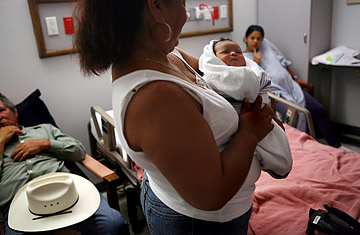
A Mexican woman holds her granddaughter, an American citizen. The child's parents crossed the Mexico-U.S. border into Texas to deliver their baby at a Catholic family clinic that specializes in prenatal care and delivery using natural childbirth techniques, but they had to transfer to a hospital because of complications
It is among the clearest passages in the U.S. Constitution, a single sentence that tells us who shall be a citizen, defines the U.S. as different from most other nations and puts to legal rest a shameful period in American history. With all that going for it, you would think that the first clause of the 14th Amendment had earned the respect of legislators on both the left and, especially, the right — the same people who extol the plain words of the Constitution and the exceptional nature of American law.
But as Representative Steve King of Iowa and conservative legislators from five states recently made clear, you would be wrong.
In January, King introduced a bill in the House of Representatives to exclude the U.S.-born children of undocumented immigrants from the 14th Amendment's guarantee of automatic citizenship. At the same time, state legislators promised to push their own bills to deny those children the benefits of U.S. citizenship. The measures are squarely aimed at those whom many on the right derisively dub "anchor babies": kids who are U.S. citizens from birth simply because their mothers sneaked across the border to have them — or, as one Senator delicately put it, to "drop and leave."
Their alleged motives aside, plenty of undocumented women give birth in the U.S.: 3.8 million have at least one child who is an American citizen, according to the Pew Hispanic Center, and in 2008, 73% of kids of illegal immigrants were U.S.-born. As citizens, they are entitled to costly benefits, and that's one reason most countries don't allow birthright citizenship. So no matter how you feel about the issue, there's nothing necessarily nutty about denying automatic citizenship to the children of people who shouldn't be in the country in the first place.
What's nutty is that King and his allies are trying to do that through legislation rather than the far harder method of a constitutional amendment. That approach offends the plain meaning of the 14th Amendment, suggests that the U.S. should simply follow other countries' immigration laws and relies on an argument once used to deny citizenship to African Americans.
The 14th Amendment says, "All persons born or naturalized in the United States, and subject to the jurisdiction thereof, are citizens of the United States and of the State wherein they reside." Opponents of illegal immigration say kids of undocumented parents aren't covered because they aren't "subject to the jurisdiction" of the U.S.: they may owe allegiance to their parents' home country and can't gain the privileges of being an American without U.S. permission. No permission, no citizenship. The problem, then, is not with the 14th Amendment but with the courts' misinterpretation of it. A simple law can fix that.
It's a clever argument, but one that history does not support.
America's birthright citizenship derives from the 1608 English case of Robert Calvin, who was born in Scotland just after the Scottish King, James VI, also became the King of England. Calvin wanted to own land in England but couldn't unless he was a subject of England as well as Scotland. The court ruled that he was, because he and Englishmen owed allegiance to the same King. The outcome had a lot to do with James' need to consolidate his kingdom, but the rule became that anyone born on land governed by the King was a British subject — except for children of foreign invaders or diplomats, who were outside British jurisdiction.
